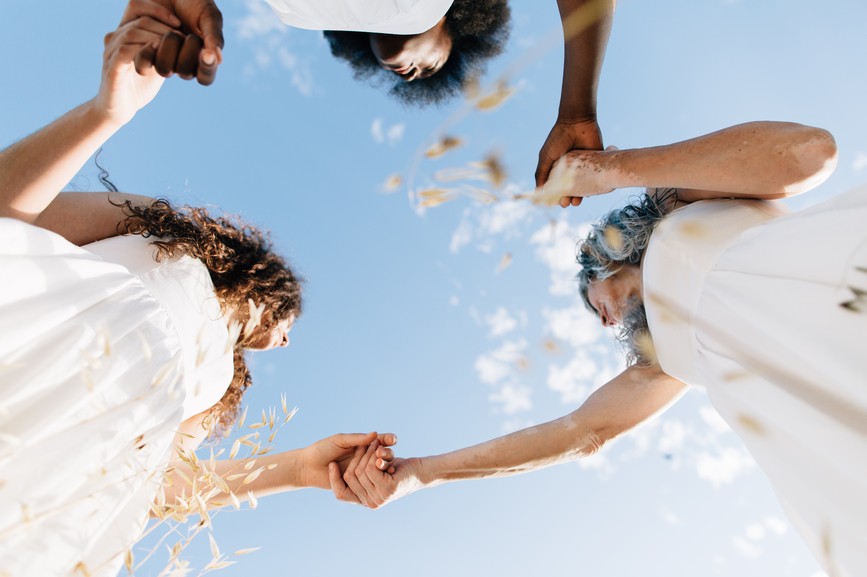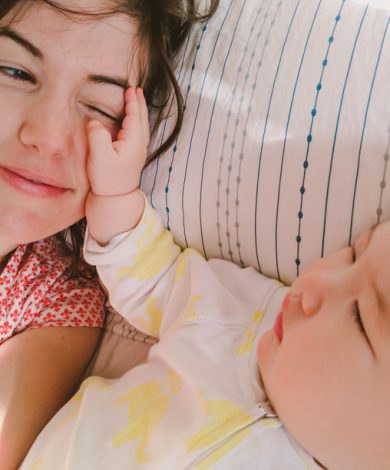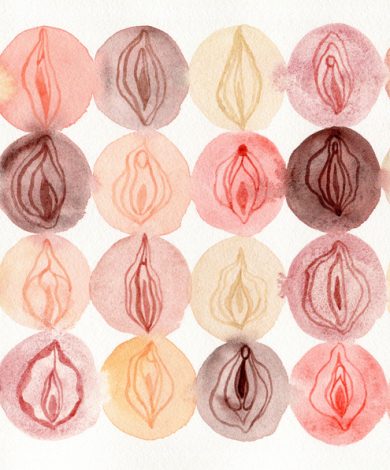Great! Congratulations! You carried a real human baby to term, birthed them out in some…
Change
Matrescence: Why Becoming A Mother Should Be As Celebrated As Getting Your Period (Baby Showers Don’t Count)
June 18, 2021 • By Anne Omland

There’s a term you likely haven’t heard of. Largely because not enough people are talking about it. And that is matresence. It was coined in 1973 by Dana Raphael, the author of Tender Gift: Breastfeeding. She says:
“Childbirth brings about a series of very dramatic changes in the new mother’s physical being, in her emotional life, in her status within the group, even in her own female identity. I distinguish this period of transition from others by terming it matrescence to emphasize the mother and to focus on her new lifestyle.”
Um, yes. Thank you, Dana for so clearly articulating decades ago what so many of us feel but don’t have the words to describe. Because we know this. We know the rite of passage of becoming a mother is chaotic, dramatic, and seismic. We know this because we experience it.
The reason matrescence isn’t widely known is because our western culture hasn’t accepted this transition as anything other than an everyday, ordinary occurrence. Choosing instead to focus on the baby, and forget the mother.
Matresence is spoken about only slightly more than it was in 1973. And we have people like Aurelie Athan PH.D. to thank. She has acknowledged that the changes that occur during matrescence encompass multiple domains: biological, psychological, social, political, spiritual, and are similar in many ways to adolescence. Which means it’s a really big deal.
In essence, matresence as an adult adolescence.
There are hormonal, physical, and physiological shifts that change how we see ourselves, how we fit into the world around us, and push us to grow into a more full expression of ourselves. It happens with pregnancy and may arguably last a lifetime! While that may seem terrifying, it’s also a reminder that we are continuously shifting, changing, and growing. It’s not all in our heads. It’s literally all changing. All the time. You can read more about this adult adolescence here.
By not recognizing, talking about, addressing the scope of change a woman is experiencing, leaving her to suffer in silence, we are not only failing mothers, we are scorning them. In America, when you are pregnant you have a baby shower. A celebration of the baby. This is a direct message to the mother and her support network that the baby is now the priority.
We know this. We get it. Our lives are already revolving around the baby. We know they will be the priority. AND the mother still matters. Western culture is missing the ceremony around becoming a mother. Across cultures there are ceremonies around life transitions. Bar/Bat Mitzvahs, Quinceaneras, Confirmation, Sweet 16. Why isn’t there one for a new mother?
The birth of your baby is your re-birth. And we have nothing to mark our birth. We can and should celebrate this transition with ceremony so that it can be witnessed. Because an unwitnessed transition is incomplete.
We are newborns too and we need to stop ignoring that fact.
I remember feeling really frustrated about everything NO ONE told me about becoming a mother. The transition. Matrescence. By not sharing experiences and preparing me I felt so isolated. Different. Like I was doing something wrong instead of understanding what to expect emotionally postpartum.
By not sharing our experiences, by withholding vital information, by not knowing what is normal or common, it can leave us feeling empty, unfinished, aching for closure so that we can confidently step into the next phase. This is why we are so passionate about and committed to sharing birth stories. Because you are not alone, it’s all insane, and telling your birth story is an important step in your healing process.
Telling your birth story, writing it, documenting and sharing your story gifts you the space to feel all of your feelings. To give a voice to everything you’re experiencing. To see and be seen. To be with others in this unknown territory.
The witnessing becomes the container for your experience. And inside the container you feel safe to really get acclimated to this new season of life. With all of its craziness. All of its joy. And all of its pain.
As you get used to your new surroundings you notice that the edges of this container become more clear. And comforting. You know who is in it with you. And who is on the outside. It brings comfort to the newborn mama the same way boundaries create safety for a toddler.
Cultivating ceremony for matrescence has the same effect. It creates a boundary, a delineation of the before and after. It honors what you are bringing with you and what you are leaving behind. We learn what to expect. We understand the new expectations we have for ourselves and others. We know that we’re held. By our community. Our village. Those who are with us witnessing our transition.
This safe container helps us to release our anxiety over the unknown. And there are a lot of unknowns. This allows us to drop into the experience, feel everything we need to feel, learn everything we need to learn, and to ride it out. We stop trying to control it or over analyze it.
Being seen, held, honored in this way also gives you permission to be with yourself. With your body after childbirth. Especially if your experience was traumatic. With our witnesses, our ceremony can be complete. Now we can meet and welcome our new body, our new home, our new self with reverence, tenderness, and grace.
Everything in your life changes after you have a baby. Talking about and honoring the transition into matrescence, and marking it with ceremony, can help us reconnect to ourselves, each other, and our experiences. This is a call to make the sacred transition into motherhood extraordinary. Because it is extraordinary.



